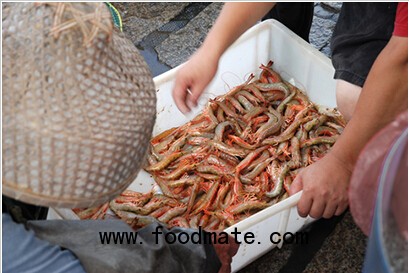Members of the U.S. shrimp industry are voicing concerns that elements of a major trade deal, the Trans-Pacific Partnership, could weaken the ability of regulators to reject unsafe seafood imports.
The concern arises as more shrimp imports from Southeast Asia are testing positive for banned antibiotics and foodborne pathogens.
More than 90 percent of the shrimp consumed in the U.S. is imported from overseas, and yet in 2014 the U.S. Food and Drug Administration (FDA) only inspected 3.7 percent of shrimp imports and tested 0.7 percent.
Moreover, U.S. shrimpers say they’re worried that new trade deals will open the borders to more shrimp farmed with trade-illegal subsidies, giving those growers an unfair market advantage, said David Veal, executive director of Wild American Shrimp.
“We recognize that international trade is essential for this country,” Veal said. “What we’re concerned about is that exporting countries to the U.S. follow the same set of production rules, processing rules, and export rules that American producers follow.”
The rules on the books are good, Veal said, but he’s not convinced that FDA has the power to enforce those rules, given the agency’s limited capacity for inspections at the border.
Shrimp producers outside of the U.S. are currently not subject to some of the same regulations as domestic growers. Most notably, some shrimp products from places such as Vietnam and Malaysia have tested positive for antibiotics, which are not allowed in U.S. shrimping operations.
In a recent study from Consumer Reports, 11 out of 342 imported shrimp samples tested positive for antibiotics, while 16 percent of cooked, ready-to-eat samples tested positive for at least one foodborne pathogen, such as Salmonella, E. coli, or Vibrio.
“These trade rules could significantly weaken food safety standards,” Veal said.
But not everyone in the seafood industry agrees.
“The suggestion by anti-trade voices that imported shrimp poses a food safety risk is part of a protectionist-driven, fake food safety scare,” said Gavin Gibbons, vice president of communications for the National Fisheries Institute.
According to data from the U.S. Centers for Disease Control and Prevention, imported seafood accounts for 0.12 percent of yearly illnesses in the U.S., Gibbons said.
Additionally, all seafood imports are subject to FDA’s Hazard Analysis and Critical Control Point (HACCP) program, he said.
When it comes to the new trade deals, however, Veal said members of the shrimp industry aren’t the only one biting their nails.
“I think you’ll find a lot of American industry shares our sentiments, especially other areas of the food industry,” Veal said. “We recognize the need for trade, but we don’t want to give the rest of the world carte blanche permission to do whatever they want to do to the food they send here.”
The concern arises as more shrimp imports from Southeast Asia are testing positive for banned antibiotics and foodborne pathogens.
More than 90 percent of the shrimp consumed in the U.S. is imported from overseas, and yet in 2014 the U.S. Food and Drug Administration (FDA) only inspected 3.7 percent of shrimp imports and tested 0.7 percent.
Moreover, U.S. shrimpers say they’re worried that new trade deals will open the borders to more shrimp farmed with trade-illegal subsidies, giving those growers an unfair market advantage, said David Veal, executive director of Wild American Shrimp.
“We recognize that international trade is essential for this country,” Veal said. “What we’re concerned about is that exporting countries to the U.S. follow the same set of production rules, processing rules, and export rules that American producers follow.”
The rules on the books are good, Veal said, but he’s not convinced that FDA has the power to enforce those rules, given the agency’s limited capacity for inspections at the border.
Shrimp producers outside of the U.S. are currently not subject to some of the same regulations as domestic growers. Most notably, some shrimp products from places such as Vietnam and Malaysia have tested positive for antibiotics, which are not allowed in U.S. shrimping operations.
In a recent study from Consumer Reports, 11 out of 342 imported shrimp samples tested positive for antibiotics, while 16 percent of cooked, ready-to-eat samples tested positive for at least one foodborne pathogen, such as Salmonella, E. coli, or Vibrio.
“These trade rules could significantly weaken food safety standards,” Veal said.
But not everyone in the seafood industry agrees.
“The suggestion by anti-trade voices that imported shrimp poses a food safety risk is part of a protectionist-driven, fake food safety scare,” said Gavin Gibbons, vice president of communications for the National Fisheries Institute.
According to data from the U.S. Centers for Disease Control and Prevention, imported seafood accounts for 0.12 percent of yearly illnesses in the U.S., Gibbons said.
Additionally, all seafood imports are subject to FDA’s Hazard Analysis and Critical Control Point (HACCP) program, he said.
When it comes to the new trade deals, however, Veal said members of the shrimp industry aren’t the only one biting their nails.
“I think you’ll find a lot of American industry shares our sentiments, especially other areas of the food industry,” Veal said. “We recognize the need for trade, but we don’t want to give the rest of the world carte blanche permission to do whatever they want to do to the food they send here.”







